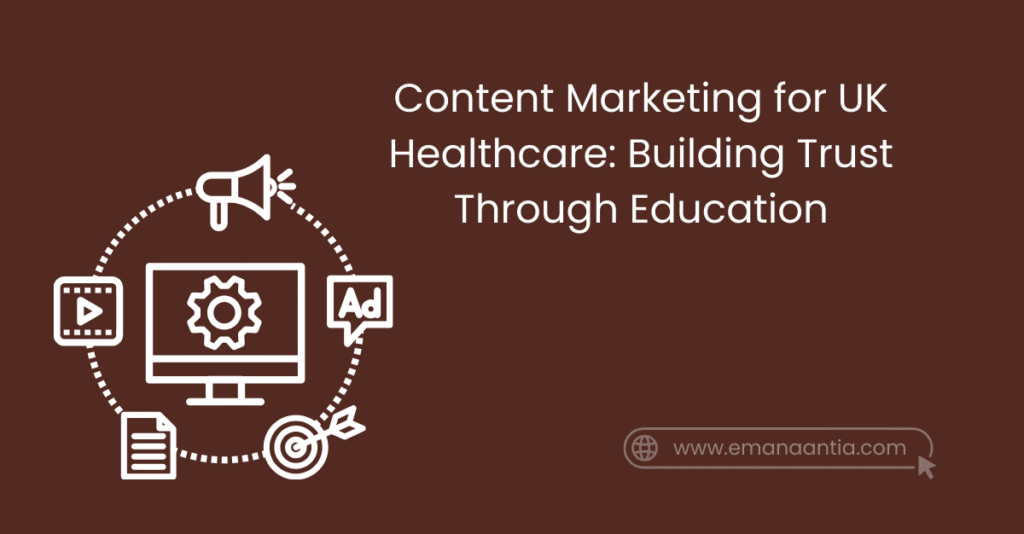In the UK healthcare sector, competition for patient attention has never been tougher. Private GPs, dentists, physiotherapists, and aesthetics clinics are all vying for visibility online. At the same time, patients are more informed than ever, with 77% of them turning to Google before booking a healthcare appointment (Think with Google).
So how do you cut through the noise, build credibility, and earn patient trust? The answer lies in content marketing for UK healthcare.
Content marketing isn’t about pushing sales; it’s about delivering useful, educational, and trustworthy content that patients actively search for. Done correctly, it’s one of the most powerful ways to improve visibility, build authority, and guide patients from awareness to booking.
Why Content Marketing for UK Healthcare Providers Actually Works
1. Builds Trust and Credibility
Healthcare is a YMYL sector (Your Money, Your Life). This means Google holds medical content to a higher standard under E-E-A-T (Experience, Expertise, Authoritativeness, Trustworthiness). Patients don’t just want information—they want it from a credible source. By publishing accurate, patient-friendly content, clinics establish themselves as trusted authorities.
2. Improves Search Visibility
Every blog post, video, or infographic is another opportunity to rank for patient queries. For example, a blog titled “How Much Does a Private GP Cost in London?” can rank for multiple long-tail keywords, driving organic traffic directly to your site.
3. Educates and Empowers Patients
Modern patients want to understand their health before making decisions. By providing content that answers questions like “Do I need braces or Invisalign?” or “What vaccinations do I need before travelling?”, you empower patients—and position your clinic as the logical next step.
4. Supports the Full Patient Journey
From awareness (blogs and videos) to consideration (guides, webinars) to booking (landing pages, case studies), content supports every stage of the funnel.
Types of Content That Work Best in UK Healthcare
1. Patient Education Blogs
- Topics: “What to Expect in a Private GP Consultation”, “Signs You Might Need a Physiotherapist”.
- SEO value: Blogs help capture long-tail queries like “emergency dentist in Manchester” or “private GP near me UK”.
- Format: 800–1,500 words, structured with FAQs for SEO.
2. Video Content
- Explainers: Short clips on treatments (“How Teeth Whitening Works”).
- Testimonials: With consent, showcase patient stories.
- YouTube & TikTok: YouTube works for evergreen content, TikTok for quick awareness (especially aesthetics and wellness).
3. Social Media Content
- Instagram/Facebook: Before-and-after visuals, educational reels.
- LinkedIn: Professional thought leadership (especially for private GPs and specialists).
- TikTok: Growing in popularity for healthcare awareness—quick health tips, myth-busting.
4. Infographics & Guides
- Infographics like “Step-by-Step Guide to Invisalign” are highly shareable and attract backlinks.
- Downloadable patient guides can double as lead magnets (exchange email for access).
5. Case Studies & Success Stories
- Example: “How Our Aberdeen Clinic Reduced Appointment Wait Times by 40%.”
- Case studies provide proof of results and build credibility.
Compliance in UK Healthcare Content Marketing
Creating content in healthcare comes with unique responsibilities.
- ASA (Advertising Standards Authority): Ads and content must not make misleading or exaggerated claims.
- GMC & NHS Guidelines: Avoid promising guaranteed outcomes; focus on factual, balanced information.
- GDPR: Patient data (case studies, testimonials, newsletter signups) must be collected and used with explicit consent.
Pro Tip: Use disclaimers like “Results vary by patient” where necessary, and always keep content medically accurate.
Best Practices for Healthcare Content Strategy in the UK
1. Identify Patient Pain Points
Start with FAQs your reception staff hear daily. If patients are asking, others are Googling.
2. Use Keyword Research
Tools like Google Keyword Planner and SEMrush help identify real patient searches (“private GP cost UK”, “NHS vs private dentist”).
3. Apply E-E-A-T
- Experience: Share real doctor insights.
- Expertise: Ensure content is reviewed or written by qualified professionals.
- Authoritativeness: Reference credible sources (NHS, medical journals).
- Trustworthiness: Secure website (SSL), clear privacy policies, transparent authorship.
4. Follow the 80/20 Rule
- 80% patient education,
- 20% promotional content.
5. Repurpose Content
Turn one blog into:
- A short TikTok explainer,
- A LinkedIn carousel,
- An infographic for email newsletters.
Measuring Content Marketing Success
Content must deliver ROI, not just clicks.
- Traffic Metrics: Blog visits, video views.
- Engagement: Average time on page, comments, social shares.
- Lead Generation: Downloads of guides, newsletter signups.
- Conversions: Appointment bookings from content-driven traffic.
Tools: Google Analytics, HubSpot CRM, SEMrush, Mailchimp.
Quick Wins UK Clinics Can Implement Today
- Publish a blog answering your most common patient question.
- Record a short “explainer video” on a core service (e.g., dental implants).
- Share one patient testimonial (with consent) on social media.
- Optimise one existing blog with targeted keywords and better CTAs.
- Add a “Patient Resources” section to your website.
Case Study Example
A London-based clinic saw a 120% increase in website traffic and a 21% uplift in patient enquiries after launching a content strategy. They produced blogs like “The Truth About 2D and 3D Mammography in the UK” and “What to Expect At Your First Breast Screening Appointment,” repurposed them into Instagram Reels, and pushed monthly patient newsletters. Within six months, they were ranking top 3 for multiple local keywords.
This is the power of content marketing in action.
Building Trust Through Education
In the UK healthcare landscape, content marketing is the bridge between patients and providers. By educating patients, you not only improve visibility but also build long-term trust—a priceless commodity in healthcare.
From blogs and videos to social media and patient guides, the right content strategy helps your clinic become the first choice when patients are ready to book.
It’s not about selling services; it’s about delivering value. The patients—and Google—will reward you for it.
Ready to build a content strategy that attracts patients and builds trust? Get in touch to start your tailored healthcare content marketing plan.
